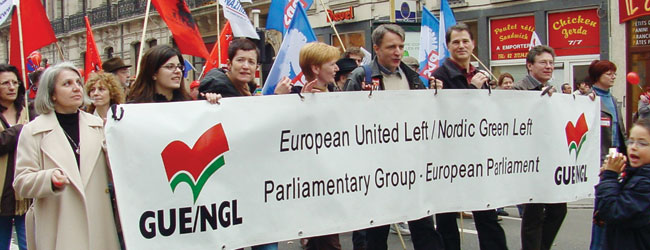30 September 2011
The State of the European Union
 MUCH was being made of the importance of the European Commission President’s annual ‘State of the Union’ address to MEPs on September 28th to the future of the EU. All the kerfuffle ignores the fact that, with every passing week, EU leaders find themselves at least once in “now or never” or “crunch time” meeting, yet none of the so-called crisis summits has produced a solution to the debt crisis nor put a brake on unbridled financial speculation.
MUCH was being made of the importance of the European Commission President’s annual ‘State of the Union’ address to MEPs on September 28th to the future of the EU. All the kerfuffle ignores the fact that, with every passing week, EU leaders find themselves at least once in “now or never” or “crunch time” meeting, yet none of the so-called crisis summits has produced a solution to the debt crisis nor put a brake on unbridled financial speculation.
As austerity hammers low-income and middle-income earners (especially in those economies stuck in deep recession) demand, investment and social cohesion are further weakened across the EU. Although those in charge of policy accuse credit rating agencies of engaging in speculation that is destabilising European economies, they are not taking any measures to tackle it. On the contrary, they are upgrading them to the status of ‘supreme referees’. It’s not just markets who doubt the ability of governments and the EU institutions to provide solutions, it’s the citizens. This is the sad State of the Union and this is the reality President Barroso should confront.
In the ‘State of the Union’ debate, MEPs from the European United Left/Nordic Green Left (GUE) group in the Parliament highlighted for EU leaders the awful results of their policy and inaction. Our focus is on building solidarity with those resisting austerity across Europe; emphasising public investment in job creation to tackle unemployment (especially for young people); arguing that the ‘super rich’ and banks must pay for their crisis rather than workers, pensioners, the unemployed, students, young people and the socially excluded; and the campaign for real democracy, scrutiny and democratic controls over decision-making.
The other, directly related, issue overshadowing the plenary week is the so-called ‘six pack’ of economic governance reports coming up for votes in Strasbourg (also on Wednesday). These six pieces of EU legislation propose to give the Commission in Brussels the power to sanction countries that do not follow ‘approved’ budgetary and macro-economic policies.
A pact on this controversial dossier was struck between major players in parliament and the big member states and therefore the texts ooze centre-right and conservative thinking. The need for social justice and public investment are thus absent from the proposed new rules, as is the fact that the current EU obsession with austerity is prolonging what is a pro-cyclical crisis. This blinkered approach to fiscal policy is a clear political choice and those who promote it are doggedly refusing to abandon their destructive ideology in spite of the clear evidence that it is the cause, not the solution, to the economic problems facing Europe.
Follow us on Facebook
An Phoblacht on Twitter
Uncomfortable Conversations

An initiative for dialogue
for reconciliation
— — — — — — —
Contributions from key figures in the churches, academia and wider civic society as well as senior republican figures




